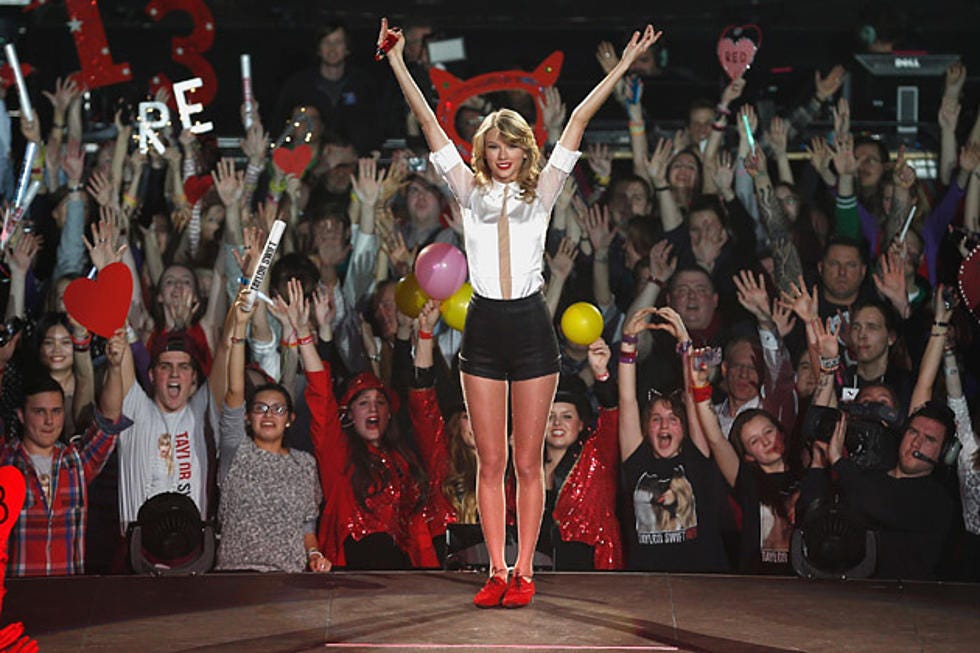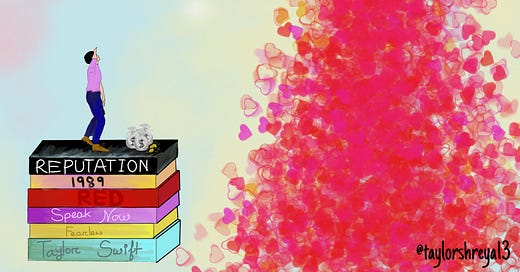Catalyzing Fandom: How Taylor Swift's Fans Tempered with Scooter's Potential ROI
Will the increased volatility of an artists ability to influence their fan-base effect the industries appetite to monetize artist catalogs?

Drawing by @taylorshreyal3
Happy Monday! Hope everyone had a great Fourth of July weekend. Thanks for opening the third edition of the Stan newsletter. A weekly newsletter exploring fans and their bidirectional relationships with the artists that they love. As always suggestions and feedback are always appreciated. You can shoot me an email at dkuhlor@gmail.com or respond directly to this newsletter.
Taylor Swift surprised many last week when she penned an open letter detailing her unhappiness with Scooter Braun owning her masters. The letter sparked a larger debate about ownership and how large fan-bases can be weaponized effectively. With virtually unlimited resources at her disposal, Taylor Swift chose to publicly air her grievances because her greatest chance at winning this battle is by mobilizing her fans. As the week progressed the narrative Taylor created was frequently questioned through rebuttals by Yael Cohen (Scooter Braun's Wife) and Scott Borchetta (founder of the Big Machine Record Label). However, as time passes it becomes more apparent that the end goal of Taylor’s letter was to encourage her fans to stop streaming her previous catalog, thus devaluing the largest asset in the Scooter Braun/Big Machine deal, while helping her promote her new catalog (which she consequently owns the masters for).
Artist First Taylor: The Tidal Effect

Taylor Swift has been solidifying her brand as being artist-first for years. The two most memorable examples of this are her open letter to Tim Cook and the announcement of her Universal deal. Taylor was able to go against Apple (and win) when she penned an open letter detailing why artists deserved to get paid during Apple's 90 day trial. Regardless of the outcome it was a smart and calculated move for Taylor as it thrust the issue into national spotlight, showed that she was willing to leverage her star power to influence outcomes favorable to all artists, all while putting Apple on the defense. By making it public that if a consumer used Apple Music artists would not get compensated for their work it decreased Apple Music's anticipated momentum as fans felt more compelled to use a streaming service that was paying artists. Additionally, by securing a victory she also secured respect and admiration from people and artists around the world for something not directly tied to her music.
The authenticity of her artist first mentality is exactly the narrative that Scott and Yael attempt to discredit in their responses to Taylor by attempting to frame her as a bully focused solely on herself. By discrediting a core part of her brand they encourage fans to question the motives behind her decision to publish an open letter int he first place. In Yael's open note to Taylor she frequently acknowledges the power of her fan-base largely through her requests for them not to be involved. Yael states "It's easy to see that the point of putting this out was to get people to bully him" and "I hope you have the dignity, class, and kindness to leave your fans out of this and have an open discussion." The vote of support for Scooter is further hammered home by Big Machine founder Scott Borchetta in his open letter to Taylor. While his letter details Taylor declining to participate in events around the Manchester shooting and the Parkland March (most likely to shift fan sentiment) most interesting is Scott's statement around the issue at hand. He states "Taylor had every chance in the world to own not just her master recordings, but every video, photograph, everything associated to her career. She chose to leave." I like to think of this being Scott’s attempt to invoke what I think of as the "Tidal Effect". To this day one of Tidal's biggest uphill battles remains shifting the initial narrative that they launched their platform with. Many still have not forgotten the press conference that Telegraph dubbed "The Most Pompous Event in the History of Music" where many of the world's richest musicians got on stage to declare the launch of the first "artist-owned" streaming platform. The press conference backfired as it did not resonate with the broader population as consumers viewed it as a convening for the "rich to get richer" and questioned why and how smaller artists would truly benefit from the platform. Did Taylor have the choice to purchase her catalog? While that should be the debate, it has now become Taylor vs. Scooter (and all his associated acts and his fan-bases) making the truth practically irrelevant if her fans have already decided the answer.
What Doesn't Kill You Makes You Stronger + Measuring Success

Ironically, it appears that the responses did little to change the minds of Taylor Swift fans as they only felt more empowered. Taylor Swift fans spent the week rising to the occasion by polling other artists, using Twitter and other social media platforms to debate naysayers, and mobilizing via the #WeStandWithTaylor. Most fascinating is how her her fan-bases became more effective at polling Taylor's peers about the situation compared to the actual media industry. In the past a media outlet would have attempted to reach artists for comment for which they most likely would have declined but by flooding an artist's social channels with news about Taylor (i.e Ed Sheeran) many artists were forced to draw a fork in the sand, a move which could divide their own fan base. As time progresses we will have to see how Taylor Swift's future catalog will stack up against her previous one now that her fan-base is empowered with the ownership backstory. The ultimate measure of #WeStandWithTaylor and the dominance of Taylor Swift's fans can be asserted via which parts of Taylor’s catalog they choose to stream vs. which they don't. If #WeStandWithTaylor grows into fans actively choosing not to listen to Taylor's old catalog as they do not want to feel like they are supporting Scooter Braun. We will have to wait and see whether the increased volatility an artist and their fan-base plays in monetizing assets could discourage the growing number of entrants purchasing artist masters.

